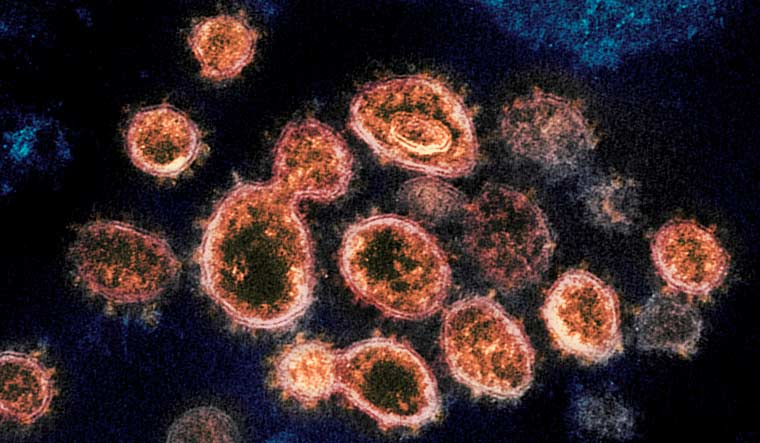After South Africa raised the alarm about a new coronavirus variant with a “very high” number of mutations, many other countries have identified the new strain, which will likely have the “nu” moniker (as "mu" was taken in September). So far, it has been identified in South Africa, Botswana, Hong Kong, Israel and now, Belgium.
The B.1.1.529 variant was identified after genome-sequencing data from Botswana was analysed, according to a Nature article. It stood out as it had more than 30 changes to the spike protein (which the virus uses to recognise host cells and which vaccines typically target). A high number of mutations could result in the variant being vaccine resistant. Many of these mutations are the same as those found in the Delta variant; mutations that have been linked to heightened infectivity and the ability to evade infection-blocking antibodies.
ALSO READ: ‘New South African COVID variant is worst seen': What we know about B.1.1.529
“The concern is that when you have so many mutations, it can have an impact on how the virus behaves,” Dr Maria Van Kerkhove of the World Health Organization said on Thursday.
What makes the strain concerning is the speed with which it has spread in South Africa (where less half the population is fully vaccinated). Compared to the Delta and Beta variants, it has spread many times faster to become the dominant variant.
Five quick tweets on the new variant B.1.1.529
— John Burn-Murdoch (@jburnmurdoch) November 25, 2021
Caveat first: data here is *very* preliminary, so everything could change. Nonetheless, better safe than sorry.
1) Based on the data we have, this variant is out-competing others *far* faster than Beta and even Delta did 🚩🚩 pic.twitter.com/R2Ac4e4N6s
A WHO expert group held a meeting on Friday to discuss the new strain. WHO has cautioned countries against imposing travel restrictions based on the variant, advising a “risk-based and scientific approach”.
WHO has generally been opposed to travel bans: As early as January 30, 2020, it opposed travel bans to China, when it still considered the then-nascent COVID-19 situation an emergency. By May, months into a full blown global pandemic, it maintained its stance against such bans.
The EU has become the first bloc to block flights to South Africa, after a case of the variant was identified in Belgium—the first country to identify it in Europe. The infected patient had returned from Egypt via Turkey and was a young unvaccinated woman. She developed symptoms 11 days after going to Egypt but had no links with South Africa or other high-risk countries.
EU Commission President Ursula von der Leyen said flights should be suspended until we have a clear understanding about the danger posed by this new variant, and travellers returning from this region should respect strict quarantine rules.
British Health Secretary Sajid Javid told lawmakers that the new version may be more transmissible than the delta variant and render vaccines less effective. The UK was among the first countries to impose a travel ban on South Africa following the announcement of the new variant.
“We must move quickly and at the earliest possible moment,” Javid said.
Stocks have plunged in Asia, Europe and the United States. The Dow Jones Industrial Average dropped 800 points at the start of trading. Oil prices plunged, with US crude off 6.7 per cent at $73.22 per barrel and the international Brent benchmark off 5.6 per cent at $77.64, both unusually large moves for a single day. The pandemic caused oil prices to plunge during the initial outbreak of the pandemic in 2020 because travel restrictions reduced demand for fuel.
Airlines shares were hammered, with Lufthansa off 12.4 per cent, IAG, parent of British Airways and Iberia, off 14.4%, Air France-KLM down 8.9 per cent and easyJet falling 10.9 per cent.
Speaking before the EU announcement, Dr Michael Ryan, the head of emergencies at the WHO, warned against "knee-jerk responses". We've seen in the past, the minute there's any kind of mention of any kind of variation and everyone is closing borders and restricting travel. It's really important that we remain open and stay focused, Ryan said.
Israel detected the case in a vaccinated traveller who had returned from Malawi. In Hong Kong, two cases were identified; one from a patient who had travelled from South Africa, the other from a person who was infected during hotel quarantine.
According to an ANI report, no cases of the B.1.1.529 variant have been reported in India so far.
India on Friday announced that scheduled international flights at 75 per cent of pre-COVID operations would resume on December 15 with limited services to 14 nations. These include countries with whom India has an “air bubble” agreement, four of which have already identified cases of the new variant: South Africa, Botswana, Israel and Hong Kong (the others being the United Kingdom, Singapore, China, Brazil, Bangladesh, Mauritius, Zimbabwe and New Zealand).
Other countries designated as “at risk” but without “air bubble” agreements with India can resume 50 per cent of bilateral capacity entitlements, the Aviation Ministry said.
With inputs from PTI




